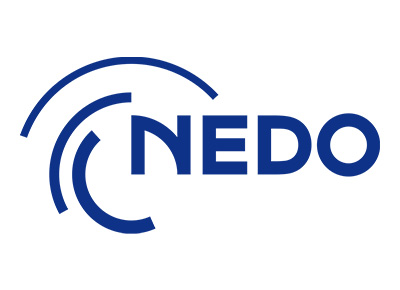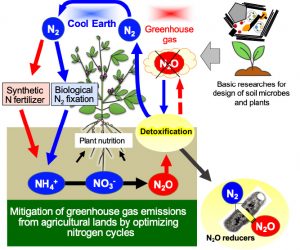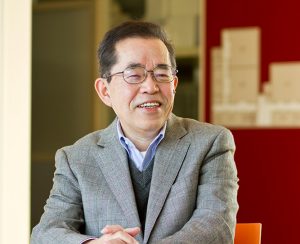Moonshot Goal 4
「Realization of sustainable resource circulation to recover the global environment by 2050.

Project title
Mitigation of greenhouse gas emissions from agricultural lands by optimizing nitrogen and carbon cycles
Mitigation of greenhouse gas emissions from agricultural lands by optimizing nitrogen and carbon cycles
Project Summary

We aim to develop innovative technologies to mitigate greenhouse gases from agricultural soil by 2030, and to achieve an 80% reduction of greenhouse gas emissions from agricultural soil by 2050, as a part of Moonshot Goal 4 ‘Cool Earth’.
Nitrous oxide (N2O) is a powerful greenhouse gas with a global warming potential of 265. Agriculture accounts for 59% of global anthropogenic N2O emissions. Paddy rice fields are also a source of methane (CH4) emissions, accounting for 11% of the global anthropogenic CH4emissions. Thus, it is essential to mitigation of greenhouse gases from agriculture. In the natural nitrogen cycle, atmospheric nitrogen gas (N2) is fixed by microorganisms and converted into reactive nitrogen such as ammonia and nitrate.
Reactive nitrogen circulate ecosystem and eventually return to the atmosphere as nitrogen gas (N2). Although modern agriculture has succeeded to increase food production using chemical nitrogen fertilizers, N2O emission from agricultural soil is increasing rapidly. In this research project, we will develop mitigation technologies by using soil microorganisms regarding nitrogen and carbon cycles.
We found that some rhizobia can reduce N2O to N2. Also, methanotrophs are known to
oxidize CH4 to CO2 . We will maximize such microbial processes at the field scale. However, the biggest challenge is that artificially inoculated microorganisms are usually eliminated due to the robustness of the soil ecosystem. Therefore, by integrating the latest research methods and young researchers in different disciplines, we unveil the whole pictures of soil microorganism world, and reorganize plant ̶ microbe relationships in order to achieve our goal.

Homepage of the research project
Related sites
〇Cool Earth via dSOIL
〇Minamisawa Laboratory
〇NEDO Moonshot
〇NEDO Homepage Top
For inquiries about this project
dsoil.moonshot※grp.tohoku.ac.jp
(Please change * to @)

